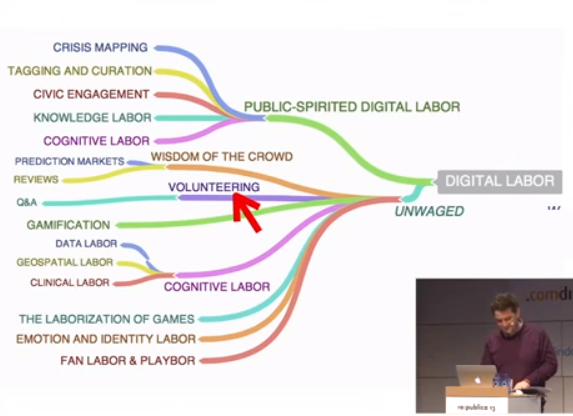Summary of Trebor Scholtz’ Talk The talk is an overview of online crowdsourcing which is wiping away 100 years of progress in labour rights according to Trebor Scholz.
 Digital labour is now allowing for a return to child labour, 8 hour work day, unethical business practices ALL through distance based employment. There is an increased precarious lifestyle emerging with unpaid student internships are being one characterisations offline as well as sweat shops in the Philippines. What we are seeing now is a new digital workforce that is being exploited by entrepreneurs.
Digital labour is now allowing for a return to child labour, 8 hour work day, unethical business practices ALL through distance based employment. There is an increased precarious lifestyle emerging with unpaid student internships are being one characterisations offline as well as sweat shops in the Philippines. What we are seeing now is a new digital workforce that is being exploited by entrepreneurs.
 Business has used interesting language to characterise these activities. These labourers don’t see themselves as employees. They call themselves task-rabbits, cloud-workers. Amazon’s Mechanical Turk has anonymous tasks that pay very poorly. Mechanical Turk is 70% US female workers and 30% India degree educated workers. Research shows that some people aren’t doing these tasks for money, they trying to learn English. 18% of Amazon Mechanical Turk users are considered full time: $2.00 per hours. There are problems like delayed payment, mobilisation for labour rights is not easy. Users pick from a wide range of task Clickworkers are working as if it is past time. Playbour is another way to describe this labour. From Scholz’ perspective, their activities are considered totally alienating: no identity of the employers and the works on Amazon’s Mechanical Turk (you don’t get to see who your employers is for example).
Business has used interesting language to characterise these activities. These labourers don’t see themselves as employees. They call themselves task-rabbits, cloud-workers. Amazon’s Mechanical Turk has anonymous tasks that pay very poorly. Mechanical Turk is 70% US female workers and 30% India degree educated workers. Research shows that some people aren’t doing these tasks for money, they trying to learn English. 18% of Amazon Mechanical Turk users are considered full time: $2.00 per hours. There are problems like delayed payment, mobilisation for labour rights is not easy. Users pick from a wide range of task Clickworkers are working as if it is past time. Playbour is another way to describe this labour. From Scholz’ perspective, their activities are considered totally alienating: no identity of the employers and the works on Amazon’s Mechanical Turk (you don’t get to see who your employers is for example).
 Other forms of so-called Playbour are less obvious. HuffingtonPost started in 2005 by aggregating various leftwing blogs with posts from Obama and Oprah alongside random quality bloggers until 2011 when Mrs. Huffington sold the company to AOL for $350 million dollars. The bloggers were not compensated for the new wealth acquired through this transaction. In fact, the bloggers were never ever paid for any of the posts that were featured on the site. A strike was endorsed by the Newspaper Guild of America and even a lawsuit of $105 million was filed for compensated. That class action lawsuit was lost and the strike ended rather quickly. Making money off the backs of bloggers was exactly how Huffington made her wealth from Scholtz’ perspective. This is another example of people writing for exposure when they don’t even know the value of their work.
Other forms of so-called Playbour are less obvious. HuffingtonPost started in 2005 by aggregating various leftwing blogs with posts from Obama and Oprah alongside random quality bloggers until 2011 when Mrs. Huffington sold the company to AOL for $350 million dollars. The bloggers were not compensated for the new wealth acquired through this transaction. In fact, the bloggers were never ever paid for any of the posts that were featured on the site. A strike was endorsed by the Newspaper Guild of America and even a lawsuit of $105 million was filed for compensated. That class action lawsuit was lost and the strike ended rather quickly. Making money off the backs of bloggers was exactly how Huffington made her wealth from Scholtz’ perspective. This is another example of people writing for exposure when they don’t even know the value of their work.
 “If you are not paying for a service the chances are you are the product, according to Trebor.” Dallas Walker Smythe (from Saskatchewan, Canada) coined the idea of the audience commodity. Facebook, Linked etc are all engaged in cognitive labour. Every time we make a Facebook post or send Linkedin message, we increase the value of those companies through the page views that this newest form of exploitation generated. Depending on how valuable the other half of the exchange is to you as user. Alternative structures to facebook.com have had technical problems of their own. They didn’t manage to bring in users. Example, Diaspora.com which could have been (may still be) the alternative….
“If you are not paying for a service the chances are you are the product, according to Trebor.” Dallas Walker Smythe (from Saskatchewan, Canada) coined the idea of the audience commodity. Facebook, Linked etc are all engaged in cognitive labour. Every time we make a Facebook post or send Linkedin message, we increase the value of those companies through the page views that this newest form of exploitation generated. Depending on how valuable the other half of the exchange is to you as user. Alternative structures to facebook.com have had technical problems of their own. They didn’t manage to bring in users. Example, Diaspora.com which could have been (may still be) the alternative….
 Positive Models for Crowdsourcing: There are some positive non-commercial forms of work that Scholtz really likes. Such as Distributed Proofreaders, ScienceCommons, Click Workers which is public spirited. Scholtz wants to restrict other kinds of work. Fairnopoly is an example of a fair-trade marketplace that is worth looking into further. There are new efforts to unionise online labour. Unionised labour online for crowdsource. Crowdspring has had a law suit from a user who feels he was a user. With Amazon Mechanical Turk now allows for a tool called Turkopticon to have more accountable employee and employer relations. Trebor Scholz is looking to help users sue major companies like Amazon and then states that these lawsuits will likely fail base don the laws on the books but perhaps one crazy judge will make a descending decision….
Positive Models for Crowdsourcing: There are some positive non-commercial forms of work that Scholtz really likes. Such as Distributed Proofreaders, ScienceCommons, Click Workers which is public spirited. Scholtz wants to restrict other kinds of work. Fairnopoly is an example of a fair-trade marketplace that is worth looking into further. There are new efforts to unionise online labour. Unionised labour online for crowdsource. Crowdspring has had a law suit from a user who feels he was a user. With Amazon Mechanical Turk now allows for a tool called Turkopticon to have more accountable employee and employer relations. Trebor Scholz is looking to help users sue major companies like Amazon and then states that these lawsuits will likely fail base don the laws on the books but perhaps one crazy judge will make a descending decision….
 Motivation in crowdsourcing is another paradoxical discovery. Paying people to make Wikipedia entries actually has an interesting result; having multiple prices for your contribution based on posts actually demotivates them. Trebor Scholz labour standards should be brought online: he thinks it is absurd to underpay people online & Scholz is very angry about that.
Motivation in crowdsourcing is another paradoxical discovery. Paying people to make Wikipedia entries actually has an interesting result; having multiple prices for your contribution based on posts actually demotivates them. Trebor Scholz labour standards should be brought online: he thinks it is absurd to underpay people online & Scholz is very angry about that.

